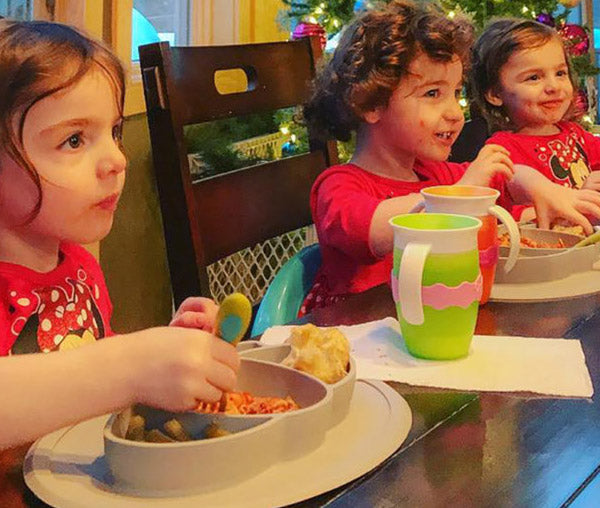
October 30, 2020
How to Get a Child to Focus and Eat a Meal
“Uh oh!”
As my toddler utters these two words, I look up to catch her flinging food onto the floor. Again. My dog is pleased, but I am definitely not amused. Last time I checked, “uh oh” doesn’t apply when you’re intentionally making it rain peas, chicken, and noodles.
My 18-month-old knows how to test my patience at the end of a long day by playing with her food, rather than eating it. Being able to get a child to focus and eat a meal is a daunting task. Here are a few tips I’ve tried with success to keep mealtimes productive and enjoyable.
1. If your toddler throws food: don’t react.
If you haven’t started feeding your baby solids yet, you might still have a chance to implement this tried and true advice: Keep a neutral face and don’t react when your baby throws food.
For me, on the other hand, it’s easy to feel like that ship has sailed. Over the past year, all I’ve done is react, both positively and negatively. I’ve giggled while picking up the food and returning it to her tray. I’ve tried to calmly explain that food is for eating, not for throwing. I’ve even sternly scolded her with a sharp “no!” Spoiler alert: none of these tactics worked.
Unfortunately, the joke’s on me! By responding in any manner whatsoever, I was inadvertently giving her the attention she wanted and encouraging her to continue the behavior. Babies and toddlers throw food for a myriad of reasons, including developing fine motor skills and exploring how cause and effect works. It only makes sense that little ones like to test their parent’s limits and get a rise out of them. The trick is to not give them that satisfaction.
Luckily, there’s no time like the present to change a bad habit. To get a child to focus, sometimes you just have to be boring. I’ve started ignoring her when she throws food, silently picking up the food and taking it to the sink, rather than putting it back on her tray. When the “game” isn’t as fun, she just doesn’t do it as often.

2. If your toddler refuses to eat: remove distractions.
To help focus her attention on the meal, I’ve also eliminated distracting variables. My daughter loves watching Ginny, the dog, gobble up whatever she’s discarded on the floor. For that reason, I purposefully use a baby gate to keep Ginny out of the room during breakfast, lunch, and dinner. Thankfully, I’ve already noticed my daughter consuming more and throwing less as a result.
To get a child to focus better, it is also helpful to think about other distractions in the room. That could look like older siblings playing in their seats, or screens at the table. Slowly eliminate one thing at a time to see if it helps your child to focus on the task at hand.
3. If your toddler dislikes the meal: encourage independent feeding.
I’ll admit that I’m a little bit of a control freak. Up until recently, I didn’t want to put a plate or bowl on the high chair or let her use a spoon or fork on her own. I was too afraid of the mess I predicted she would make.
However, last week during an epic mealtime meltdown, she refused to eat a single bite. Just as I was about to give up hope, assuming she no longer liked her favorite meal, she reached for the fork. I decided to give it to her and she was delighted at the opportunity to be independent, smiling big and opening wide. From that point on, I helped her spoon food onto the utensil and let her feed herself. Lo and behold, she ate the entire meal! Now that I’ve given her free reign to try and feed herself, she practices scooping up the food by herself too. Win-win.

4. If your toddler eats for part of the meal, then act's up: recognize the signs of being full.
As toddlers grow, their appetite varies across the board. Some days they are ravenous and want to eat more than a grown adult, and other days they just don’t seem interested in food.
My pediatrician says this is fine and normal behavior, but to pay close attention when my daughter starts to throw food. He says it might be an indication that she’s full. Now when I observe her slowing down, I try to intervene and ask her if she’s finished before she has a chance to start playing with her meal. By staying in tune with her needs, especially before she can fully communicate her preferences, she no longer feels the need to work for my attention in destructive ways.
How do you get a child to focus when at the dinner table? I’d love to hear all the tips and tricks that have worked for your family.